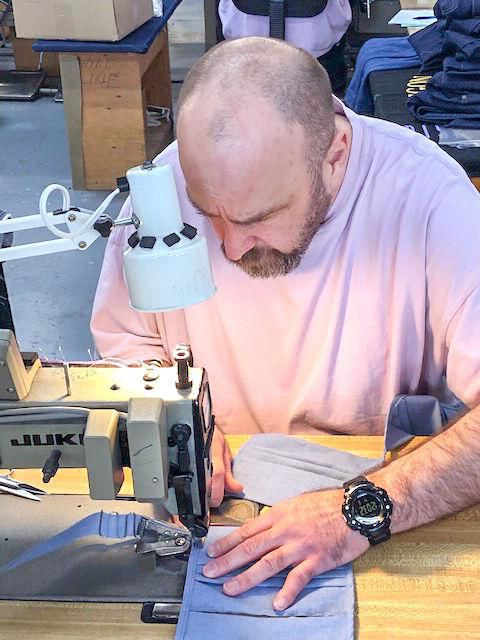Eastern Oregon prison inmates produce masks
Published 8:00 pm Wednesday, April 8, 2020

- An inmate makes a mask at the garment factory in Eastern Oregon Correctional Institution, the state’s medium security prison in Pendleton.
PENDLETON — The garment factory at the Eastern Oregon Correctional Institution produces everything from jeans and jackets to placemats and potholders.
In the face of COVID-19, however, the 67 inmate workers in the garment factory in the state prison in Pendleton are temporarily producing one product only — masks.
“We started a week ago Friday,” said Scott Bartholomew, EOCI’s Oregon Correctional Enterprises general manager. “We pretty much shut down the rest of our production.”
Three other prisons — Two Rivers Correctional Institution in Umatilla, Snake River Correctional Institution in Ontario and Coffee Creek Correctional Facility in Wilsonville — also are making masks. Bartholomew said his crew embraced the project.
“I’m really proud of our (adults in custody) here,” he said. “They know this is the time to step up to the plate and do something for the community.”
“We’re hoping to produce over 4,000 a day once everyone is up and running,” said Jennifer Starbuck, communication and program manager at Oregon Corrections Enterprises in Salem.
Starbuck said the masks first will go to inmates, correctional officers and prison staff, but eventually will be distributed outside prison walls.
“We’re getting requests from our hospital customers and other state agencies,” Starbuck said.
Bartholomew said the EOCI garment factory is “uniquely suited to do this kind of work.” The other facilities have sewing operations, but not garment factories.
The EOCI factory normally operates Monday through Friday, but most of the crew volunteered to work last Saturday, too. So far, the sewers average as many as 3,500 masks a day, using light blue chambray material in a 50-50 cotton-polyester blend.
The idea of prisons as mask producers came from Maria Rodriguez, OCE production coordinator at Snake River Correctional Institution. Dr. Christopher DiGiulio, the chief of medicine for the Oregon Department of Corrections, inspected a prototype while at EOCI and approved a mask design that would provide proper filtration.
Bartholomew said the masks aren’t medical grade — yet.
“They are utility masks. They are not certified,” he said. “We’re trying to source medical-grade material. We’d like to be able to achieve that certification to be more useful to the medical community.”
Bartholomew is spending part of each workweek looking for materials to keep the operation flowing, especially trying to locate medical-grade materials at a reasonable price.
“I’ve been spending an inordinate amount of time procuring materials to put in the pipeline to feed this program,” he said. “Right now, we’re looking at 65,000 or 75,000 masks we have to produce.”
EOCI doesn’t yet have a case of coronavirus within its prison walls. So far, an inmate at the Santiam Correctional Institution and a staff member at the Oregon State Penitentiary, both in Salem, have tested positive for COVID-19. EOCI may have a good shot at escaping the virus given the prison was already in lockdown mode because of a flu outbreak in late February. Hand sanitizer and masks were distributed and those with symptoms were quarantined. Visitation and activities, downsized during the flu epidemic, became further restricted as the pandemic revved up.
“We already had things well in place,” Bartholomew said. “The institution did a superb job in minimizing the spread of infection.”
He said the prison’s foray into mask production could possibly continue down the road as they master medical-grade masks.
Mask production isn’t the only DOC contribution in this time of pandemic. Eleven Snake River inmates man a 211 call center to disseminate information about COVID-19.
In the future, the prison system also may manufacture hand sanitizer.




